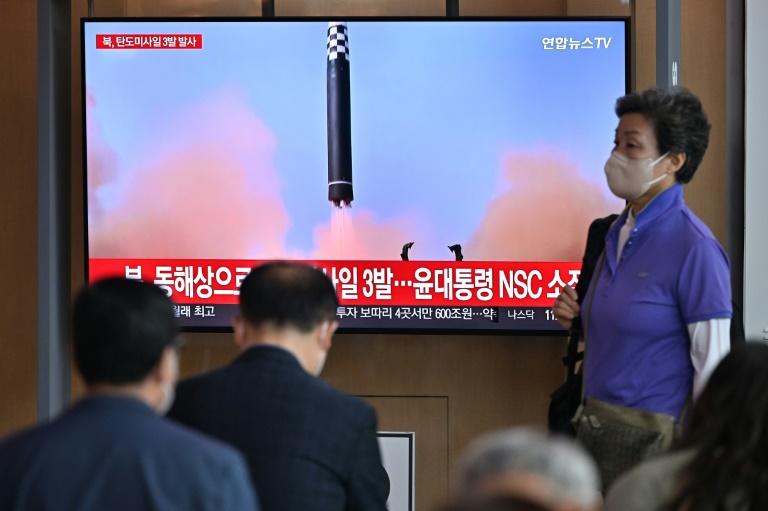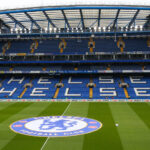
North Korea fired a volley of missiles early Wednesday including a suspected intercontinental ballistic missile, just hours after US President Joe Biden left Asia after a trip overshadowed by Pyongyang’s sabre-rattling.
Three missiles — including one suspected ICBM — were fired from the Sunan area in Pyongyang, Seoul said, where an airfield has become a key site used in multiple recent weapons tests by the nuclear-armed regime.
The launch, one of nearly 20 weapons tests by Pyongyang so far this year, prompted joint US-South Korea live fire missile drills in response, as both sides slammed what they called continued “provocations” by the nuclear-armed state.
The tests are “an illegal act in direct violation of UN Security Council resolutions,” Seoul’s government said after a National Security Council meeting chaired by new President Yoon Suk-yeol.
The United States condemned the “destabilizing” launches, and called for Pyongyang to “engage in sustained and substantive dialogue,” a state department spokesman said.
South Korea’s Joint Chiefs of Staff said in a statement that it had “detected at around 0600 (2100 GMT), 0637 and 0642 the firings of ballistic missiles launched from Sunan area towards the East Sea”, it said, referring to the Sea of Japan.
“The first ballistic missile (suspected ICBM) had a range of around 360 kilometres (225 miles) and an altitude of around 540km,” Seoul’s Joint Chiefs of Staff said in a statement.
The second ballistic missile “disappeared at an altitude of 20km” and the third — a suspected short range ballistic missile — travelled around 760km at an altitude of around 60km.
– Response to Biden –
The Wednesday launches are the latest in a blitz of sanctions-busting weapons tests by Pyongyang this year, including test-firing intercontinental ballistic missiles at full range for the first time since 2017.
The latest apparent test come just days after Biden left South Korea Sunday after a trip overshadowed by US and South Korean officials warning that Kim could carry out a nuclear test while Biden was in the region.
The tests were “clearly timed for President Biden’s return after his visit to South Korea and Japan,” Park Won-gon, a professor at Ewha University said, adding that Biden hadn’t even touched down in the US.
During Biden’s visit, South Korea and the US announced they would look at ramping up joint military exercises, which had been scaled back for Covid and during a bout of failed diplomacy with the North.
They also discussed deploying more US tactical assets to the peninsula — all which would likely enrage Pyongyang, which views the drills as rehearsals for invasion.
“North Korea’s objections against these announcements was expressed through the missile launches,” Park said.
On his last day in Seoul, Biden told reporters he had a only a short message for Kim: “Hello. Period.”
But he added that the United States was “prepared for anything North Korea does”.
– Covid and missiles –
“Pyongyang appears to have launched different types of missiles, probably in the process of improving related military capabilities,” said Leif-Eric Easley, a professor at Ewha University in Seoul.
“But this also looks like a statement that the Kim regime has many different ways of striking an adversary.”
Kim has recently doubled down on his programme of military modernisation.
Despite struggling with a recent Covid-19 outbreak, new satellite imagery has indicated the North has resumed construction at a long-dormant nuclear reactor.
Earlier this month, North Korea confirmed its first ever Omicron cases in Pyongyang, and the virus has since torn through its unvaccinated population of 25 million.
More than three million people have been sick with “fever” North Korean state media said Wednesday, with 68 deaths since the outbreak began in late April.
North Korea has continued to conduct missile tests since it declared a national emergency over the Covid outbreak, although state media has not reported on the launches, as it usually does.
“It shows Pyongyang’s intent to achieve two objectives simultaneously: overcoming the outbreak and enhancing its nuclear arsenal,” said Yang Moo-jin, a professor at the University of North Korean Studies.
“Kim seems to be saying that the North is in charge of the security issues that are affecting the Korean peninsula, not Washington,” he added.
Seoul’s Foreign Minister Park Jin and US Secretary of State Antony Blinken spoke on the phone after the Wednesday launches, the Foreign Ministry said.
The pair said it was “deeply deplorable” that North Korea “is using its main financial resources for nuclear and missile developments rather than quarantine and improvement of people’s livelihood” in the outbreak.
sh-kjk-cdl/ceb/je




